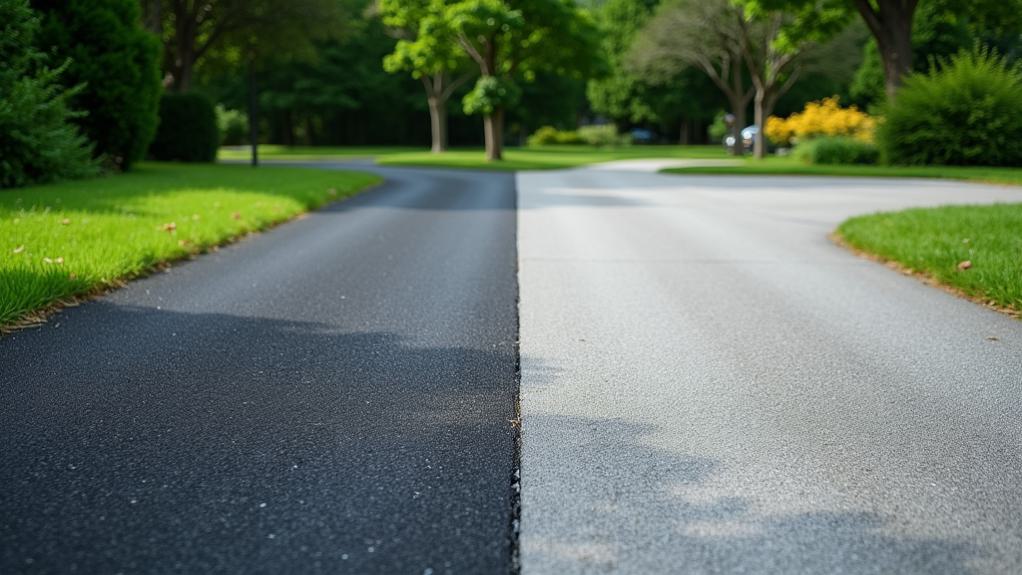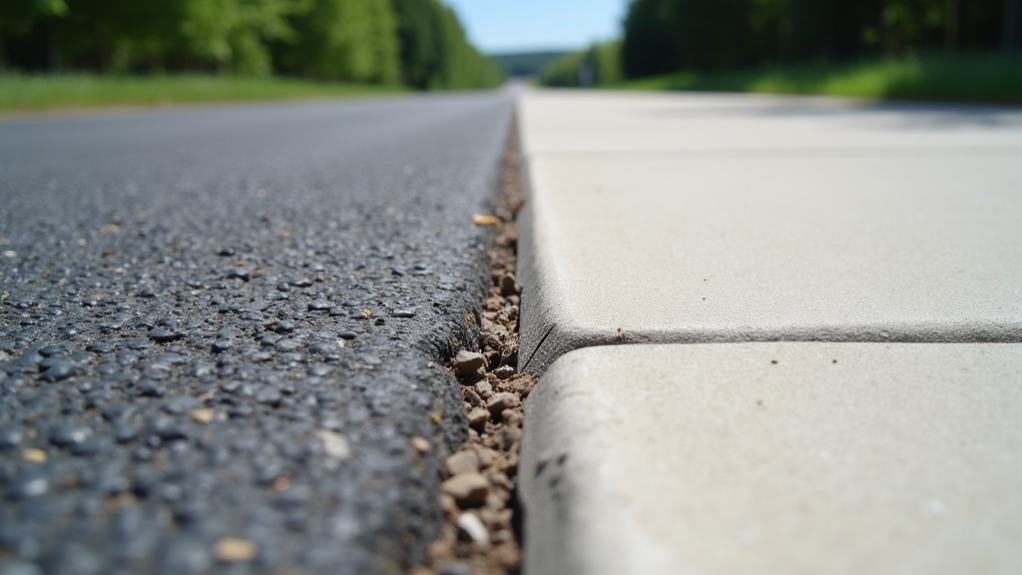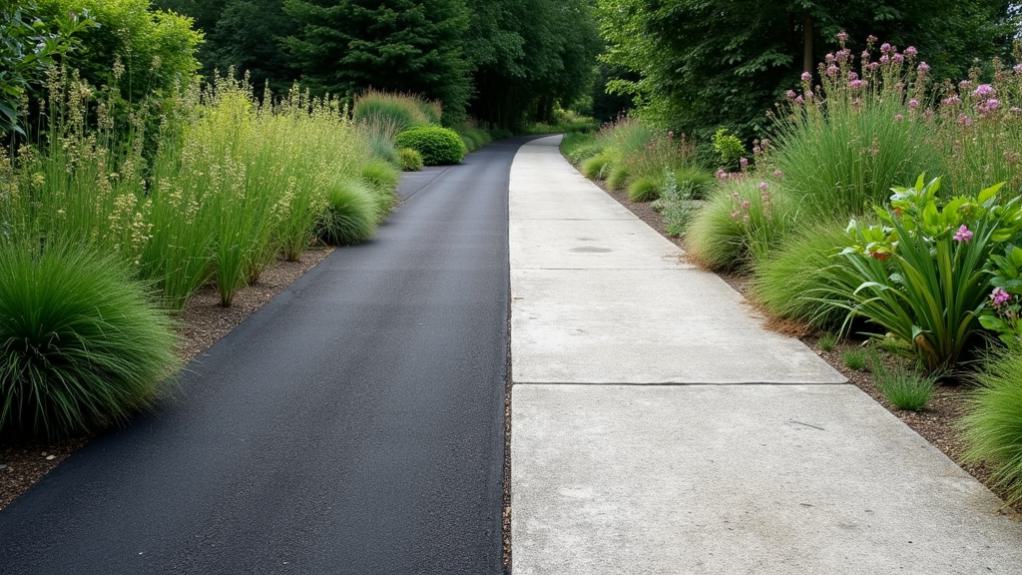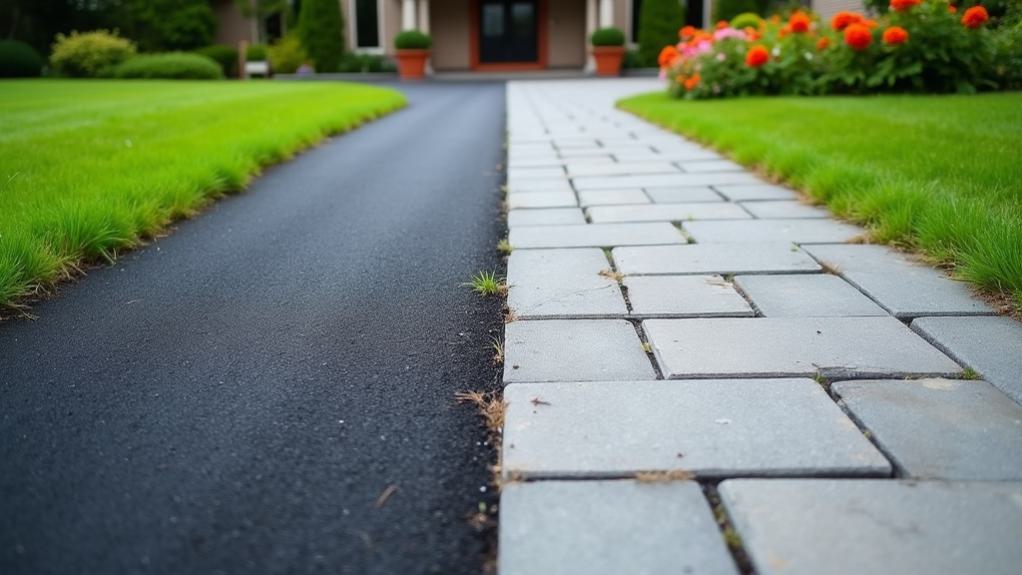Yes, asphalt driveways are generally cheaper to install than concrete ones. You can expect asphalt installation costs to range from $2 to $4 per square foot, while concrete costs about $4 to $6 per square foot.
Asphalt offers a budget-friendly solution upfront, and it installs quicker, typically in 1 to 2 days. However, asphalt may require sealing every 3 to 5 years, which can add to long-term maintenance costs. In contrast, concrete lasts longer and handles heavy traffic better. To find out more about the differences in durability and maintenance, you might explore further options.
Key Takeaways
- Asphalt installation costs range from $2 to $4 per square foot, making it generally cheaper than concrete, which costs $4 to $6 per square foot.
- Asphalt offers a lower initial expense, attractive for budget-conscious homeowners.
- While asphalt has lower upfront costs, long-term maintenance may exceed initial savings compared to concrete.
- Asphalt installation is quicker, taking 1 to 2 days, while concrete may take up to a week to cure.
- Ultimately, while asphalt is cheaper initially, concrete’s durability may offer better long-term value.
Cost Overview of Asphalt and Concrete

When evaluating driveway options, many homeowners find that asphalt is often the more budget-friendly choice. The installation costs for asphalt typically range from $2 to $4 per square foot, making it cheaper than concrete, which usually comes with a price tag of $4 to $6 per square foot. This initial cost advantage makes asphalt an attractive option for those looking to save money upfront.
Additionally, companies like Nathans Paving & Seal Coating offer a thorough range of asphalt paving services, ensuring quality workmanship and competitive pricing. However, it’s vital to reflect on the long-term costs associated with both materials.
While asphalt may have lower installation costs, it generally requires more frequent maintenance, including repairs and sealcoating, which can add up over time. Asphalt driveways usually last around 20 to 30 years with proper care, whereas concrete can last 30 to 50 years. This difference in longevity means that while asphalt may start off cheaper than concrete, ongoing maintenance could make it costlier than asphalt in the long run.
Additionally, both materials can incur extra expenses for drainage systems, necessary for effective stormwater management. Overall, while asphalt is often the cheaper option for driveway paving, evaluating long-term costs is essential for making an informed decision.
Installation and Maintenance Costs
Installation and maintenance costs play an essential role in deciding between asphalt and concrete driveways. When you look at installation costs, asphalt driveways typically range from $2 to $4 per square foot, making them more affordable than concrete driveways, which usually cost between $4 and $6 per square foot.
Importantly, with over 10 years of industry experience, Quality Asphalt Paving Services in Lemoyne can provide competitive rates and quick project completions. The initial installation of asphalt is quicker, often completed in just 1 to 2 days, while concrete can take up to a week to cure fully.
In terms of maintenance costs, asphalt requires sealing every 3 to 5 years, whereas concrete needs resealing every 1 to 3 years. This difference means asphalt might be less costly to maintain over time. Additionally, asphalt’s maintenance involves simpler repair techniques, like crack sealing and patching, which are generally less labor-intensive than maintaining concrete.
Though asphalt has a shorter lifespan of around 20 to 30 years with proper care, its lower initial costs can make it a more budget-friendly option for homeowners.
Ultimately, understanding these installation and maintenance costs will help you make an informed decision in the asphalt vs concrete debate.
Longevity and Durability Comparison

Choosing between asphalt and concrete for your driveway involves understanding not just installation and maintenance costs, but also how long each option will last and how well they hold up over time.
When comparing asphalt vs concrete, the longevity and durability of each material play a significant role in your decision. Here’s a quick comparison:
| Factor | Asphalt | Concrete |
|---|---|---|
| Lifespan | 15 to 20 years | 30 to 60 years |
| Maintenance Needs | Sealcoating every 3-5 years | Resealing every 1-3 years |
| Durability | Less resistant to heavy traffic | More resistant to heavy traffic |
| Repair Frequency | More frequent repairs | Fewer repairs needed |
| Initial Costs | Lower upfront costs | Higher upfront costs |
Asphalt may seem cost-effective initially, but its shorter lifespan and higher maintenance needs could lead to greater long-term expenses. Concrete’s durability allows it to withstand extreme weather and heavy traffic better, reducing the frequency of repairs. Ultimately, if you prioritize longevity and reduced maintenance, concrete is a smarter investment over time.
Pros and Cons of Each Material
Both asphalt and concrete driveways come with their own set of advantages and disadvantages, making it essential to weigh them carefully before making a decision.
Asphalt is typically more affordable, with installation costs ranging from $2 to $4 per square foot, compared to concrete’s $4 to $6. Additionally, choosing a reliable service for your asphalt needs can lead to a quick project turnaround, such as having your driveway completed in just 4 hours, as seen with trusted asphalt paving services. It also has a quicker curing time, allowing immediate use after installation.
However, asphalt’s longevity is shorter, lasting about 20 to 30 years with proper maintenance, while concrete can endure 30 to 60 years.
In terms of repairs, asphalt is easier and less costly to maintain, as it requires simple patching. Concrete may need more intensive repairs and occasional de-greasing, which can increase long-term maintenance costs.
On the aesthetic front, concrete offers diverse customization options through stamping and staining, while asphalt primarily features a dark color and smooth finish.
Ultimately, the pros and cons of each material hinge on your budget, desired durability, maintenance commitment, and aesthetic preferences. Carefully consider these factors to make the best decision for your driveway needs.
Environmental Impact Considerations

When considering the environmental impact of driveway materials, asphalt stands out as a more eco-friendly option. Its 100% recyclability guarantees that it can be reused repeatedly, reducing waste and conserving resources. In contrast, concrete generally has a lower recycling rate.
Here are some key environmental benefits of asphalt:
- Lower Carbon Footprint: Asphalt production emits fewer greenhouse gases compared to concrete, making it a better choice for sustainability.
- Enhanced Water Drainage: Permeable asphalt surfaces promote groundwater recharge and reduce surface runoff, helping manage water effectively.
- Utilization of Recycled Materials: Incorporating reclaimed asphalt pavement supports sustainability, while concrete’s use of recycled aggregates is less common.
While asphalt can contribute to urban heat island effects by absorbing heat, its overall efficiency in water management and recyclability makes it a strong contender against concrete.
Concrete’s reflective properties can mitigate temperature increases but often lead to increased surface runoff.
When weighing your options, consider how the material’s environmental impact aligns with your sustainability goals. Choosing asphalt can help lower your carbon footprint and support eco-friendly practices.
Conclusion
In the battle of driveways, asphalt often emerges as the more budget-friendly choice, but it’s crucial to weigh its shorter lifespan against concrete’s durability. Think of it like choosing between a quick meal and a hearty feast; one satisfies immediate needs, while the other offers lasting nourishment. Ultimately, your decision should hinge on your budget, aesthetic preferences, and how long you want your driveway to last. With careful consideration, you’ll pave the way to the right choice for your home.



